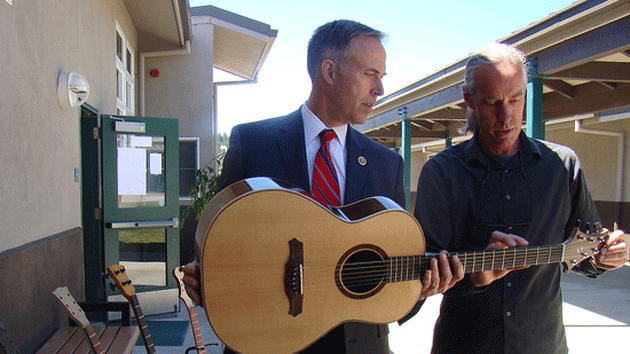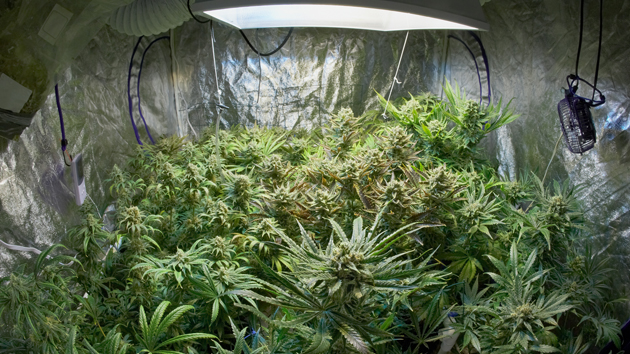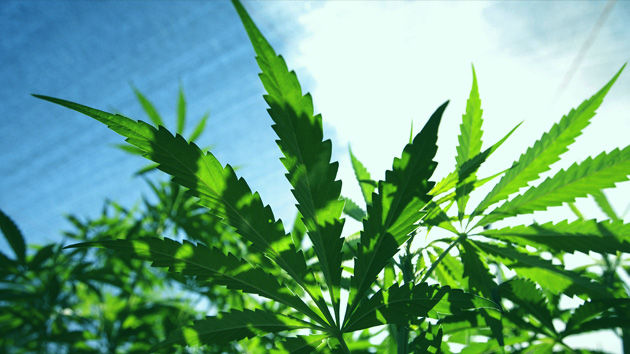
US Rep. Jared Huffman (D-Calif.), playing a guitar
Two years ago, California Rep. Jared Huffman, who had previously served as a state assemblyman and an attorney with the Natural Resources Defense Council, was elected to represent a district stretching from Marin County all the way to the Oregon border. It includes the Emerald Triangle, the three-county region that produces most of America’s domestically grown marijuana. Huffman’s people got in touch after seeing my recent story, “The Landscape-Scarring, Energy-Sucking, Wildlife-Killing Reality of Pot Farming.” The congressman wanted to discuss, among other things, how he proposed to deal with the devastation that results from trespass grows on public lands.
Mother Jones: What’s it like being the highest-elected official from the nation’s epicenter of marijuana cultivation?
Jared Huffman: I tell people that I represent the district with a third of the California coast, the biggest trees in the world, some of the best wine grapes in the world, and about 60 percent of the marijuana produced in America.
MJ: In fact, marijuana is the primary industry in your district. How do you approach that?
JH: It makes it that much more important that we find our way to a coherent marijuana policy, and that’s what I try to work on. Right now, we are talking about one of the most urgent pieces, which is to discourage these trespass grows that are causing so much environmental damage on public and private lands.
MJ: Is it safe to say that marijuana farming is now the biggest environmental issue in your district?
JH: It is right at the top, number one. It has some competition: We have climate change and lots of other things, but this is creating some of the most acute effects, with consequences that could include extinction of species. When I learned about these trespass grows and saw what people were doing to our streams and our fisheries and our watersheds, I was outraged.
MJ: You’re the sponsor of a bill called the PLANT Act, which would crack down on some of the most destructive pot gardens.
JH: The objective is to set stronger penalties where trespass grows are found. The illegal water diversions, the rampant use of toxic chemicals, the cutting down of trees, the destruction of wildlife—when these things are present in a trespass grow, we want there to be very, very stiff penalties.
MJ: But the people who tend to get busted at these grows are usually the low-level guys, often undocumented Latin American immigrants. The hard part is to catch their employers, the guys with the connections and the money. How is this bill going to change that?
JH: We have to begin to send a message that this is going to be taken seriously. The message to date has been that you can get away with this and there really is no consequence.
MJ: What’s your personal stance on pot?
JH: I am not by any stretch an enthusiast or fan of marijuana. I don’t use it. I don’t want any kids anywhere to use it; if I ever find one of my kids using it, they are in big trouble. But I just think we have to face reality. This criminalization policy has been a failure by absolutely any measure. And we’ve got to learn the lessons of [alcohol] prohibition, find better ways to manage this substance. My hope is that we can deal with this the way we have dealt with tobacco: It has never been criminalized, but we have done a great job of reducing tobacco use, and we haven’t had to lock anyone up for selling or using it.
MJ: How would the environmental problems associated with cannabis change if it were legalized?
JH: I think it would change overnight. You don’t see people trekking back into the forest to grow soybeans.
MJ: But in 2010, all three counties in the Emerald Triangle voted against Proposition 19, the state ballot measure that would have made pot legal for recreational use. Growers feared that it would cause prices to drop and hurt their bottom lines. So how would ending prohibition benefit your constituents?
JH: It’s going to be a mixed bag for some people. Those who have derived their livelihood from the high prices of marijuana—it being an illegal substance—are going to have to adjust to that. The feedback I’m getting is that the days of romanticizing the mom-and-pop pot grower are gone. That the influx of cartels and violent crime and the out-of-control nature—especially of the trespass growing—has changed things. All of it has taken us to a tipping point. Even in the Emerald Triangle, I now hear widespread calls for legalization. Many people who used to oppose legalization are now seeing it differently.
MJ: How often to do you hear from marijuana growers?
JH: I don’t really hear from growers as an organized community.
MJ: There’s the Emerald Growers Association, but I gather that most growers aren’t very politically active.
JH: There was a time when they seemed like they might be able to organize themselves, when it looked like medical cannabis might be suitable to local ordinances and professional associations, but the incoherence of our marijuana policy has really frustrated that.
MJ: In your view, when is pot finally going to be legalized on the federal level?
JH: I think faster than anybody would have thought, even just a few years ago. I went up in a helicopter a few months ago with Dan Rather and we looked at some trespass grows in the Arcata area. He almost laughed at me when I said I thought that this administration could make meaningful moves towards decriminalization. Less than two weeks later, we got the new policy guidance from Attorney General Holder and the administration—that they are going to actually lay out a path to federal deference to the states on marijuana. Truthfully, I think the tipping point is here and now. I think we are past it. I have no doubt at all that, within a small number of years, you are going to have many states with legal marijuana for adults. [See “Map: Will Your State Be Next to Legalize Pot.”]
MJ: Yet even if California legalizes marijuana, the trespass grows will continue for as long as there’s a black market in other states. When will that problem be solved?
JH: It’s a good point. Nontrafficking across state lines is one of the conditions of [Eric Holder’s] policy guidance. I think states are going to have to move together. I am told that Oregon may have a measure on the ballot very soon. So you can envision a scenario in the very near future where neighboring states have decriminalized marijuana and the product that is grown on the North Coast could be legally marketed in all of them.
MJ: How can your district adjust to the mainstreaming of pot?
JH: I suspect that someday in a world with legal marijuana for adults, you will probably have branding that occurs for different types of the product. The popularity of the North Coast brand, which has historically been part of the reason why it has such a premium on the underground market, should carry over to the legal market as well. But the good news is there will actually be some standards and safeguards. People will know what they are getting, how it’s grown, the entire supply chain of how it gets to them. So really I think the smart thing to do for those in my district who want to stay in that business is to be at the leading edge of setting very high standards for that new industry.
MJ: I’m surprised that more elected officials aren’t on record as being in favor of legalization, given that so many national polls show that most voters want it.
JH: Look at how quickly members of Congress had to catch up with same-sex marriage. They had just about gotten their talking points down on civil unions, when all of a sudden the country got ahead of them.
MJ: Times change, right?
JH: They do. And I think people can at least appreciate the sensibility behind the position I have. It is not a pro-marijuana position. It is a common-sense position.


















